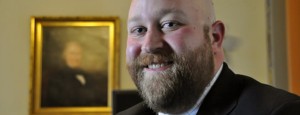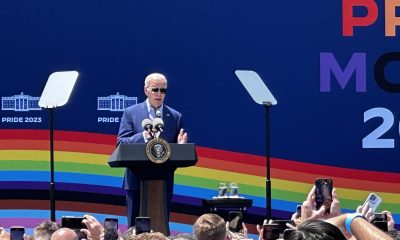National
First openly gay U.S. House reading clerk relishes role
Joe Novotny ‘tremendously proud’ to take prominent position

Joe Novotny, the first openly gay U.S. House reading clerk, reads bills, resolutions and messages from the president to Congress. (DC Agenda photo by Michael Key)
It’s part of making history.
That’s part of the reason Joe Novotny enjoys his role as reading clerk for the U.S. House.
Just last week, he had the distinction of reading to House members Rep. Charlie Rangel’s (D-N.Y.) message announcing his intent to resign as chair of the Ways & Means Committee. That message, issued by Novotny, went through the media to reach people across the country.
Other milestones in which Novotny may soon take part could include the passage of health care reform — or the repeal of “Don’t Ask, Don’t Tell.”
“You just feel the energy when you walk out on the House floor,” Novotny told DC Agenda. “If there’s a vote, or even just a heated debate, if something’s happening — the feeling that you get from that room is probably unlike anything everywhere else that you could really describe.”
And yet, Novotny is making history simply by holding the job. The 34-year-old Chicago native is the first openly gay person to work as a reading clerk in the U.S. House. Charged with reading messages to lawmakers and having his performance broadcast across the world on C-SPAN, Novotny is one of the most visible figures in House proceedings.
“I’m tremendously proud,” he said. “I feel like it’s an opportunity to represent the community. When you think about the diversity in this House now — and the fact that we have the first woman speaker and we have the first African-American clerk of the House — this is sort of a Congress of firsts, so to be a part of that is a tremendous honor.”
As reading clerk for the House, Novotny is charged with reading messages to House members and ensuring legislative measures before the chamber are clearly articulated to lawmakers and the public. He also tracks changes to bills made on the House floor.
“As House reading clerk, you’re responsible for reading all the bills and resolutions that come up throughout the day — and so there are all these other letters that come and messages from the president, and so you are responsible essentially for reading and representing these people,” Novotny said.
Other duties for Novotny include delivering House-approved measures to the Senate and working with official reporters to transcribe remarks in case a House member wants them stricken down.
Novotny is one of two reading clerks for the House. The other reading clerk, Susan Cole, was appointed by Republican leadership. Novotny and Cole are under the jurisdiction of Lorraine Miller, the House clerk and chamber’s official record keeper.
U.S. House Speaker Nancy Pelosi appointed Novotny to his role in December, and he’s served in the position for six weeks. No newcomer to Capitol Hill, Novotny was a congressional page when he was 16. For 15 years, he was a staffer for the House Education & Labor Committee, most recently as chief clerk for the panel.
Now as someone who sits on the podium with the speaker or speaker pro-tempe as lawmakers debate bills, Novotny is one of the more visible figures in the House.
In a statement, Pelosi highlighted the importance of Novotny’s job and his qualifications for taking on the position.
“As reading clerk, Joe will be the voice of the House of Representatives and will play an integral role in the daily operations of Congress,” she said. “Joe brings his experience and professionalism from the Education & Labor Committee, and we are grateful for his service.”
Novotny said his sexual orientation hasn’t made his job any more difficult or impaired relationships with his colleagues.
“I’ve been very, very lucky that throughout my career on the Hill, I’ve always been met with people who have looked at me pretty much just at face value, and it’s never been an issue,” he said. “I’ve always been open about who I am and it’s always been met with understanding and respect.”
But one challenge Novotny has encountered in his new role is needing to recognize all 435 House members immediately.
“Basically you have to learn every single person by name and by sight,” he said. “If somebody’s coming up and you’re at the podium, you’re responsible for announcing who that member is as they’re voting at the end of the vote or announce their changes.”
Since his years at George Washington University, where he studied political communications, Novotny said he’s had an affinity for politics.
“I’ve always been fascinated by politics,” he said. “I think that people lose sight of the fact that politics is not just about policy, it’s about relationships.”
Novotny said people “use politics every day in our lives” in relationships with colleagues, loved ones and friends.
“So, I guess I’m fascinated by relationships that people have and how everybody uses politics in form or another,” he said.
It’s that fascination with politics that lead him to take a position as staffer on the House Education & Labor Committee under the supervision of Chairman George Miller. Novotny said leaving his old job to become reading clerk was “bittersweet” because Miller is “such a great boss.”
“The thing about him is that he’s a little informal, and he likes to just be called by his first name,” Novotny said. “It’s never Mr. Chairman or congressman. He likes to be called George. So when you have that kind of relationship from the get go, you can really — you establish this great relationship.”
In 2007, Novotny was working for the committee when it sent the Employment Non-Discrimination Act to the House floor. Lawmakers in that chamber later approved the bill.
“That was really a very, very proud moment for me to be a part of that, and actually, seeing that pass the House floor in the last Congress was great,” he said.
In a statement, Miller congratulated Novotny for landing his new position, recalling the former committee staffer’s years of service on the panel.
“Joe was an incredibly valuable asset to my staff for nearly 15 years,” Novotny said. “His unparalleled integrity and dedication helped our committee advance major policies that are making a difference in the lives of working families. I know Joe will bring the same level of enthusiasm, expertise and steadfast commitment of service to his new role as House reading clerk.”
State Department
State Department releases annual human rights report
Antony Blinken reiterates criticism of Uganda’s Anti-Homosexuality Act

Secretary of State Antony Blinken on Monday once again reiterated his criticism of Uganda’s Anti-Homosexuality Act upon release of the State Department’s annual human rights report.
“This year’s report also captures human rights abuses against members of vulnerable communities,” he told reporters. “In Afghanistan, the Taliban have limited work opportunities for women, shuttered institutions found educating girls, and increasing floggings for women and men accused of, quote, ‘immoral behavior,’ end quote. Uganda passed a draconian and discriminatory Anti-Homosexuality Act, threatening LGBTQI+ individuals with life imprisonment, even death, simply for being with the person they loved.”
Ugandan President Yoweri Museveni last May signed the law, which contains a death penalty provision for “aggravated homosexuality.”
The U.S. subsequently imposed visa restrictions on Ugandan officials and removed the country from a program that allows sub-Saharan African countries to trade duty-free with the U.S. The World Bank Group also announced the suspension of new loans to Uganda.
Uganda’s Constitutional Court earlier this month refused to “nullify the Anti-Homosexuality Act in its totality.” More than a dozen Ugandan LGBTQ activists have appealed the ruling.
Clare Byarugaba of Chapter Four Uganda, a Ugandan LGBTQ rights group, on Monday met with National Security Council Chief-of-Staff Curtis Ried. Jay Gilliam, the senior LGBTQI+ coordinator for the U.S. Agency for International Development, in February traveled to Uganda and met with LGBTQ activists who discussed the Anti-Homosexuality Act’s impact.
“LGBTQI+ activists reported police arrested numerous individuals on the basis of their sexual orientation or gender identity and subjected many to forced anal exams, a medically discredited practice with no evidentiary value that was considered a form of cruel, inhuman, and degrading treatment and could amount to torture,” reads the human rights report.
The report, among other things, also notes Ugandan human rights activists “reported numerous instances of state and non-state actor violence and harassment against LGBTQI+ persons and noted authorities did not adequately investigate the cases.”
Report highlights anti-LGBTQ crackdowns in Ghana, Hungary, Russia
Ghanaian lawmakers on Feb. 28 approved the Promotion of Proper Human Sexual Rights and Ghanaian Family Values Bill. The country’s president, Nana Akufo-Addo, has said he will not sign the measure until the Ghanaian Supreme Court rules on whether it is constitutional or not.
The human rights report notes “laws criminalizing consensual same-sex sexual conduct between adults” and “crimes involving violence or threats of violence targeting lesbian, gay, bisexual, transgender, queer or intersex persons” are among the “significant human rights issues” in Ghana.
The report documents Hungarian Prime Minister Viktor Orbán and members of his right-wing Fidesz party’s continued rhetoric against “gender ideology.” It also notes Russia’s ongoing crackdown against LGBTQ people that includes reports of “state actors committed violence against LGBTQI+ individuals based on their sexual orientation or gender identity, particularly in Chechnya.”
The report specifically notes Russian President Vladimir Putin on July 24 signed a law that bans “legal gender recognition, medical interventions aimed at changing the sex of a person, and gender-affirming care.” It also points out Papua New Guinea is among the countries in which consensual same-sex sexual relations remain criminalized.

The Cook Islands and Mauritius in decriminalized homosexuality in 2023.
The report notes the Namibia Supreme Court last May ruled the country must recognize same-sex marriages legally performed outside the country. The report also highlights the Indian Supreme Court’s ruling against marriage equality that it issued last October. (It later announced it would consider an appeal of the decision.)
Congress requires the State Department to release a human rights report each year.
The Biden-Harris administration in 2021 released a memorandum that committed the U.S. to promoting LGBTQ+ and intersex rights abroad.
The full report can be read here.
National
Same-sex couples vulnerable to adverse effects of climate change
Williams Institute report based on Census, federal agencies

A new report by the Williams Institute at the UCLA School of Law finds that same-sex couples are at greater risk of experiencing the adverse effects of climate change compared to different-sex couples.
LGBTQ people in same-sex couple households disproportionately live in coastal areas and cities and areas with poorer infrastructure and less access to resources, making them more vulnerable to climate hazards.
Using U.S. Census data and climate risk assessment data from NASA and the Federal Emergency Management Agency, researchers conducted a geographic analysis to assess the climate risk impacting same-sex couples. NASA’s risk assessment focuses on changes to meteorological patterns, infrastructure and built environment, and the presence of at-risk populations. FEMA’s assessment focuses on changes in the occurrence of severe weather events, accounting for at-risk populations, the availability of services, and access to resources.
Results show counties with a higher proportion of same-sex couples are, on average, at increased risk from environmental, infrastructure, and social vulnerabilities due to climate change.
“Given the disparate impact of climate change on LGBTQ populations, climate change policies, including disaster preparedness, response, and recovery plans, must address the specific needs and vulnerabilities facing LGBTQ people,” said study co-author Ari Shaw, senior fellow and director of international programs at the Williams Institute. “Policies should focus on mitigating discriminatory housing and urban development practices, making shelters safe spaces for LGBT people, and ensuring that relief aid reaches displaced LGBTQ individuals and families.”
“Factors underlying the geographic vulnerability are crucial to understanding why same-sex couples are threatened by climate change and whether the findings in our study apply to the broader LGBTQ population,” said study co-author Lindsay Mahowald, research data analyst at the Williams Institute. “More research is needed to examine how disparities in housing, employment, and health care among LGBT people compound the geographic vulnerabilities to climate change.”
Read the report
Federal Government
Lambda Legal praises Biden-Harris administration’s finalized Title IX regulations
New rules to take effect Aug. 1

The Biden-Harris administration’s revised Title IX policy “protects LGBTQ+ students from discrimination and other abuse,” Lambda Legal said in a statement praising the U.S. Department of Education’s issuance of the final rule on Friday.
Slated to take effect on Aug. 1, the new regulations constitute an expansion of the 1972 Title IX civil rights law, which prohibits sex-based discrimination in education programs that receive federal funding.
Pursuant to the U.S. Supreme Court’s ruling in the landmark 2020 Bostock v. Clayton County case, the department’s revised policy clarifies that discrimination on the basis of sexual orientation and gender identity constitutes sex-based discrimination as defined under the law.
“These regulations make it crystal clear that everyone can access schools that are safe, welcoming and that respect their rights,” Education Secretary Miguel Cardona said during a call with reporters on Thursday.
While the new rule does not provide guidance on whether schools must allow transgender students to play on sports teams corresponding with their gender identity to comply with Title IX, the question is addressed in a separate rule proposed by the agency in April.
The administration’s new policy also reverses some Trump-era Title IX rules governing how schools must respond to reports of sexual harassment and sexual assault, which were widely seen as imbalanced in favor of the accused.
Jennifer Klein, the director of the White House Gender Policy Council, said during Thursday’s call that the department sought to strike a balance with respect to these issues, “reaffirming our longstanding commitment to fundamental fairness.”
“We applaud the Biden administration’s action to rescind the legally unsound, cruel, and dangerous sexual harassment and assault rule of the previous administration,” Lambda Legal Nonbinary and Transgender Rights Project Director Sasha Buchert said in the group’s statement on Friday.
“Today’s rule instead appropriately underscores that Title IX’s civil rights protections clearly cover LGBTQ+ students, as well as survivors and pregnant and parenting students across race and gender identity,” she said. “Schools must be places where students can learn and thrive free of harassment, discrimination, and other abuse.”
-

 District of Columbia5 days ago
District of Columbia5 days agoNew D.C. LGBTQ+ bar Crush set to open April 19
-

 South America3 days ago
South America3 days agoDaniel Zamudio murderer’s parole request denied
-

 Maryland4 days ago
Maryland4 days agoMontgomery County police chief discusses arrest of trans student charged with planned school shooting
-

 Politics5 days ago
Politics5 days agoCourt records raise concerns about right-wing TikTok investor’s influence












